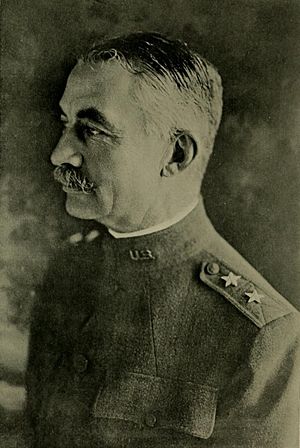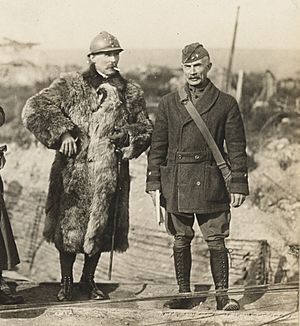Joseph E. Kuhn facts for kids
Quick facts for kids
Joseph E. Kuhn
|
|
|---|---|

From 1922's History of the Seventy-Ninth division, A. E. F. During the World War: 1917–1919.
|
|
| Born | June 14, 1864 Leavenworth, Kansas |
| Died | November 12, 1935 (aged 71) San Diego, California |
| Place of burial | |
| Allegiance | |
| Service/ |
|
| Years of service | 1885–1925 |
| Rank | |
| Unit | United States Army Corps of Engineers |
| Commands held | 3rd Engineer Battalion U.S. Army Engineer School United States Army War College 79th Division IX Corps Camp Kearny, California Schofield Barracks, Hawaii and 21st Infantry Brigade Vancouver Barracks, Washington and 5th Infantry Brigade |
| Battles/wars | Spanish–American War World War I |
| Awards | Army Distinguished Service Medal Legion of Honor (Officer) Croix de Guerre |
| Spouse(s) | Caroline Waugh Parker (d. 1916) Helen Squire (d. 1931) |
| Children | Two sons |
| Other work | Consulting engineer |
Joseph E. Kuhn (born June 14, 1864 – died November 12, 1935) was an important officer in the United States Army. He became a major general, which is a very high rank. He is best known for leading the 79th Division during World War I. After the war, he also commanded other important military groups like the IX Corps and bases like Schofield Barracks in Hawaii.
Kuhn was born in Leavenworth, Kansas. He was a brilliant student and graduated at the very top of his class from the United States Military Academy in 1885. He joined the Army Engineers. This meant he worked on building and maintaining rivers and harbors in places like Detroit and San Francisco.
He also taught at West Point and helped build new buildings there. During the Spanish–American War, he helped manage Engineer projects for the country's coastal defenses. Later, he observed armies in other countries, like Japan during the Russo-Japanese War and Germany before World War I.
Contents
Early Life and Education
Joseph Ernst Kuhn was born in Leavenworth, Kansas on June 14, 1864. His parents, Gottlieb Victor Kuhn and Anna Maria Kempel, were from Germany. Joseph went to public schools in Leavenworth. He graduated from Leavenworth High School in 1881.
After high school, Kuhn was chosen to attend the United States Military Academy. He finished first in his class of 39 students in 1885. The best students at West Point usually joined the Engineer branch. So, Kuhn became a second lieutenant in the Engineers.
Starting His Military Career
Kuhn first worked with an engineer company and at the Engineer School in Willets Point, New York. In 1888, he moved to the Detroit Engineer District. There, he helped manage projects for rivers and harbors on the east side of Lake Michigan.
He was promoted to first lieutenant in 1889. Then, he became an instructor at West Point, teaching civil and military engineering until 1894. While at West Point, Kuhn also helped design and build several new school buildings. From 1894 to 1896, he worked in the San Francisco Engineer District.
Kuhn became a captain in 1896. From 1896 to 1900, he assisted the Army's Chief of Engineers. This job included managing Engineer personnel and planning projects for the Spanish–American War coastal defenses. During the war, he held the temporary rank of major. He returned to captain in September 1899.
From 1900 to 1903, Kuhn led the Engineer company at West Point. He also taught as the head of the Department of Practical Military Engineering. From August 1903 to March 1904, Kuhn commanded the 3rd Engineer Battalion in the Philippines.
Observing Other Armies
From March 1904 to November 1905, Kuhn was a military observer for the Imperial Japanese Army during the Russo-Japanese War. He was promoted to permanent major in April 1904. After his return, he wrote a report about what he learned.
From June to September 1906, Kuhn observed the German Army during a big training exercise. He spoke German and French, which helped him connect with the Kaiser. This allowed Kuhn to make detailed notes about Germany's military. He wrote a report about his findings when he came back to the United States.
From 1906 to 1909, Kuhn was the district engineer for the Norfolk Engineer District. He managed river and harbor projects and the harbor defenses around Norfolk.
Later Military Service
Kuhn was promoted to lieutenant colonel in September 1909. He became a senior engineering instructor at the Army Service Schools at Fort Leavenworth. These schools were the early version of the United States Army Command and General Staff College.
From August 1912 to August 1913, Kuhn was the district engineer for the Philadelphia Engineer District. He was in charge of river and harbor projects and Philadelphia's harbor defenses.
From September 1913 to December 1914, Kuhn commanded the 3rd Engineer Battalion and the Engineer School at Washington Barracks. From December 1914 to March 1915, he was a military observer in Germany. He reported on the German Army during the early parts of World War I, while the United States was still neutral.
He became a colonel in March 1915. He was then assigned as a military attaché at the American embassy in Berlin. As the United States got closer to joining the war on the side of the Allies, Kuhn's role became less effective. He returned to the United States in December 1916.
World War I Leadership
In January 1917, Kuhn was promoted to brigadier general. He became president of the United States Army War College. Here, he helped prepare officers to lead divisions and corps during the war. He also helped design the Army's brigades and divisions and plan for training.
In August 1917, Kuhn was promoted to temporary major general. He was given command of the new 79th Division. Kuhn wanted a combat command, so he stayed in charge of the 79th Division.
Kuhn led the 79th Division during its training at Fort Meade, Maryland. In July 1918, the unit sailed to France. He then led the division in the Meuse-Argonne Offensive. This included capturing Montfaucon, an important location.
After the war, he commanded the IX Corps from February to March 1919. Then, he returned to lead the 79th Division back to the United States. The 79th Division was disbanded in May and June 1919.
After World War I
After the war, Kuhn returned to his permanent rank of brigadier general. He commanded the Camp Kearny, California demobilization center from July 1919 to September 1920. This center helped soldiers return to civilian life.
From September 1920 to September 1923, he commanded Schofield Barracks, Hawaii and the 21st Infantry Brigade. While in Hawaii, he also helped organize the Hawaiian Division. From October 1923 to July 1925, Kuhn commanded Vancouver Barracks, Washington and the 5th Infantry Brigade. He was promoted to permanent major general in July 1925 and retired in August.
Retirement and Legacy
After retiring, Kuhn lived in San Diego. He worked as a technical advisor and a consulting engineer. He also helped with community and charity work, including leading the San Diego Chapter of the American Red Cross.
Kuhn wrote his wartime memories, which were published in The Washington Post in March 1926. He passed away in San Diego on November 12, 1935. He was buried at Arlington National Cemetery.
Kuhn Road at Fort Belvoir, Virginia, is named after him. Fort Belvoir was once home to the Army's Engineer Center and School. Many streets and buildings there are named for famous Engineer officers.
Awards and Family
For his service in World War I, Joseph Kuhn received several important awards. These included the Army Distinguished Service Medal from the United States. He also received French awards: the Croix de Guerre and the Legion of Honor (Officer).
In 1893, Kuhn married Caroline Waugh Parker. Caroline passed away in 1916. In 1917, Kuhn married Helen H. Squire, who died in 1931. Joseph and Caroline Kuhn had two sons. Their son Richard Parker Kuhn (1894-1963) was also a soldier. He served in World War I and World War II. He became a colonel and received the Legion of Merit for his service in World War II.


